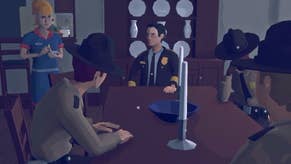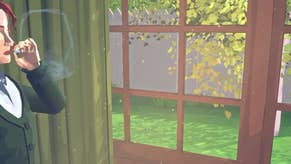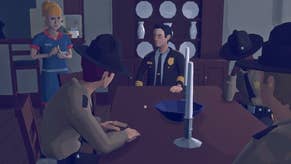Virginia, the ambiguous, artistic game where the music does the talking
A strange state of being.
A grieving family surrounded by wordless state troopers, distraught over a missing child. The silent stare of my supervisor, inscrutable across his desk. A tree resplendent with blood-red birds that escape to the sky in an explosion of noise. These are the almost dreamlike images of Virginia and they're set to a synth-stroked soundtrack somewhere between the nostalgic and the ethereal, its movements often overlaid by a gentle, yearning guitar whose reverb echoes about these strange and often surreal scenarios.
It's not enough for me to say that Virginia was the best new game that I tried at EGX last month. It's the best new game that I've seen this year and the sad truth is that we will likely have to wait until the middle of 2016 before we can play it. In the meantime, I remain rapt, even moved by Variable State's short and yet compelling demo, an experience quite unlike anything I have ever played before, an individual and idiosyncratic video game.

On the surface, Virginia appears to follow the story of a pair of FBI agents as they conduct a missing persons investigation into one of America's oldest and perhaps strangest states but, as Variable State's team tell me in a four-way Skype call, a collection of unusual influences have bled into this game to create something mysterious and even otherworldly. Virginia's first-person narrative jumps between locations and time periods, sometimes for the sake of narrative economy, other times to challenge your perception of what is happening, what has already happened, or perhaps what is even real. You're playing an unreliable narrator.
"The whole game is seen through the eyes of the main character," says designer Jonathan Burroughs. "But you can't always be certain that what you're looking at is authentic. You can't necessarily be certain when in the chronology of events things are occurring. Only at the very end can you start to piece together what you've seen and try to make sense of it."
Given Variable State's influences, this makes a lot of sense. Initially conceived as a larger project, something they came to feel was unworkable, Virginia was distilled down to a sharper and stranger game.
"We started off making something that had a far wider scope but which would've been a much more conventional game," explains Terry Kenny, Virginia's animator and artist. "I think we realised, in the process of making that, how all the stuff that we got really excited about was in the storytelling aspects of it. Our points of reference increasingly became things like The X-Files, Twin Peaks and The Silence of the Lambs, as well as a diverse range of other things beyond just games. I think it was conversations about our favourite early 90s shows that got us first thinking about Virginia."
The result is a game both influenced by and set in the early 90s, a nostalgic period for Kenny and Burroughs, as well as a chance to give a marked sense of a time and a place. Citing one of their biggest gaming influences as BAFTA winner Gone Home, the appeal of that indie hit was "playing a game that's set in a very particular time, a time that resonated with me," Burroughs says.
"Since [2013], we'd been talking about doing an indie game. We'd played things like Gone Home and Kentucky Route Zero and always said 'Let's try and do something like this in our spare time.' But then we had a lot of spare time all of a sudden, so it just seemed like the most natural thing to do."

The pair had been working for AI experts DeepMind, but found themselves unemployed just before January's Google takeover. Reflecting on how their contribution to other games had never given them a chance to have much personal input, this was now their chance to craft something distinct. And Virginia is nothing if not distinct.
The televisual and cinematic influences are clear. Unexpected match cuts take the narrative from one location to another, from an underground office to a quiet diner, while journeys through deserted woodland or the empty corridors of an FBI office are cut into brief sections that are only as long as they need to be to give a sense of travel. Longer sections give a chance to explore environments that are often populated by mute, expectant characters wearing enigmatic expressions. Virginia feels like a mix of vignettes that could alternately have been written by Chris Carter and David Lynch.
There is no dialogue, almost nothing to read and, in the demo I try, only a handful of opportunities for interaction that usually drive the story forward: a browse of a file, the paying of a bill, the opening of a door. This sparseness could be confusing, but instead it's intriguing, exactly the developer's intention.
"I think we agreed that some of the more interesting stories are open to interpretation, and I think that if we can tell a story visually that's also a little bit ambiguous, this serves our purposes very well," says Burroughs. "Not having dialogue, for example, allows you to project more onto the characters."
(I couldn't help but project a little myself, initially making the blind assumption that I was a male FBI agent and not, in fact, playing a woman. This is a very deliberate choice by Variable State. In a later email, Burroughs states that the team have "very intentionally chosen the characters we have. We intend to be responsible in our depiction of two professional women being resourceful and self-determining despite the best efforts of men and patriarchal institutions to undermine and belittle them.")
Behind all this ambiguity, Virginia's emotive soundtrack rises and falls, waiting in the background or surging to the fore, and it's at least as important as any of the game's silent characters.

"The idea is that because we're not using dialogue and there's very little text, the music will fill in the blanks," says composer Lyndon Holland, whose often beautiful soundtrack doesn't simply serve as a backdrop to events, but responds to the player's actions and the pace of the narrative.
"I didn't just want a stock piece of music that stops at the end of a scene, but for it to develop, to take the same twists and turns as the story takes as you're playing through it," he continues. It's a technical challenge that demands even more timing than a musician usually demonstrates. "[The soundtrack] will react in real time to story beats. The idea is that it'll evolve in a natural way. It requires a lot of planning. When I'm writing the music, I have to take all the game's transitions into account."
"We're trying to make life very hard for ourselves here," adds Kenny. "And by ourselves, I mean Lyndon."
Burroughs is very keen to keep Virginia's plot under wraps, but says he's excited to be writing a game that will mix the strange with the mundane, the everyday with the extraordinary. "Jonathan's been working very hard on the story and he wants to keep it to himself! I'm not even sure I even know what the full story is at this stage," Kenny jokes, while also telling me that much of its development was nevertheless a collaborative effort.
"Everybody's idea, every pitch or contribution got some discussion," he says. "Nothing was thrown away. Everything that was put on the table was talked about, about where it would fit or how it would work for us. It was an exhausting thing to do, but at the end of it it felt like we'd all contributed and I'm really happy with it."
With so much development still to go, what there is to see of Virginia now is the briefest of glimpses, but it's a tantalising one. It's obvious the game is going to appeal to those most touched by the same sort of titles that have influenced it and Burroughs estimates it will be a "movie-length" experience.
In the meantime, Variable State have certainly succeeded in putting together a compelling, even profound trailer for that experience. They are well on their way to finally putting their very personal stamp on something that could become quite singular and perhaps even an acquired taste, but I think that's exactly what they want to make. Such a personal game might not be for everyone but, personally, I'm extremely excited. Virginia's mystery has drawn me in. I must have more.









.png?width=291&height=164&fit=crop&quality=80&format=jpg&auto=webp)



